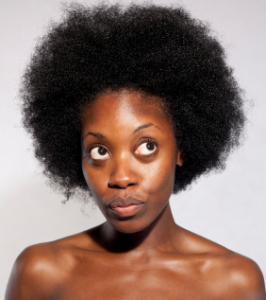 In part 1 I explained that it important to undersand and accept that afro hair from an evolutionary perspective is not built to be long and that most African tribes grew their hair long by keeping it braided or in locs. I shake my head when I hear people say that all you need to do to grow natural hair long is moisture, natural products and minimal heat. This makes sense only to a point.
In part 1 I explained that it important to undersand and accept that afro hair from an evolutionary perspective is not built to be long and that most African tribes grew their hair long by keeping it braided or in locs. I shake my head when I hear people say that all you need to do to grow natural hair long is moisture, natural products and minimal heat. This makes sense only to a point.
Remember, you are trying to make your hair do something it was never naturally intended to do and for many of us, following this simplistic advice will give us healthy but short hair. If your goal is healthy hair only or you are happy to keep your hair braided all the time or your definition of long hair is different than mine, then keep on keeping on and good luck to you!
For me, long hair is mid back length and beyond and I want to help you get there with as little fuss as possible. I find that there is little point telling ladies who are new to haircare that natural hair is easier to take care of than relaxed hair. It is not, it takes a lot more patience and a certain amount of interest in hair care, but we are all different and we don’t all take to it like ducks to water. Natural hair especially is an acquired taste for those who have been relaxed all their lives.
Single stand knots (ssk) are a major cause of breakage in natural hair wearers and even though there are methods of stretching hair naturally without the use of heat, these methods don’t work in preventing ssk’s for everyone. If your goal is long hair that you want to wear loose, a few modern conveniences like a blow dryer* or a flat iron* wouldn’t go amiss.
I believe that heat used properly can be a great addition to a natural hair regimen in spite of contrary views. From a science point of view, hair holds on to moisture longer when it is straight than when it is curly. This makes perfect sense because cuticles lie flat when hair is straight and lie slightly lifted when hair is curly.
So looking back at Mona and her perpetually short natural hair, her main problems seems to be in her combing technique, time constraints and ssk’s. She says she doesn’t have the time to do the slow methodical section by section combing that is required of natural hair. She also doesn’t enjoy doing hair in general and wants to get her weekly washes over with as quickly as possible.
After her wash, she will braid her hair down while wet and will wear the resulting braid out for the rest of the week. She has tried to do a braid out on her hair when it is partially dry but she gets more breakage when she does so and she feels that every single strand of her hair has a knot it it. Some even a high as 3 inches up the hair shaft! She feels like she is doomed to breakage no matter what she does. She has tried to blow dry her hair but finds that she is unable to get her hair stretched enough to reduce the prevalence of ssk’s.
Usually my advice to her would be to blow dry smaller sections of hair or learn the ‘stretch blow dry’ method to achieve better elongation of her strands but I already know that Mona is not interested in learning further intricate techniques. She just wants the quickest way to style her hair without the ssk’s.
When I first started my natural hair journey I never thought that chemicals should not be part of any hair journey but based on Mona’s circumstances, my suggestion would be to texturize or texlax her hair. A texturizer will keep maintain a lot of her natural hair strength but greatly reduce the ssk hence she will be able to continue her current braid out/weave regimen while keeping her length.
Without a personality transplant, Mona will not change her style of hair combing but with the texturizer, she will have fewer tangles so will be able to detangle faster and with less breakage. In time, her protective styling will start to show positive rewards.
Do I suggest texturizers for everyone? Not at all. I still believe that natural hair is the best way to grow your hair long.
At some point you have to come to the conclusion that it is your fat that makes you look fat and not your new pair of jeans, so instead of buying another pair of jeans, do something about the fat! Can you afford to keep on defending a regimen that is clearly not working for you?













